
"Little Jeannie" is a song written by English musician Elton John and Gary Osborne recorded by John, and released as a single in 1980 from John's studio album 21 at 33. It reached number three on the Billboard pop chart in the United States, becoming the singer's biggest U.S. hit since 1976's "Don't Go Breaking My Heart", and his highest-charting solo hit since 1975's "Island Girl". In the US, it would be John's highest-charting single co-written with Gary Osborne, while in the UK, where the song only reached number 33, "Blue Eyes" would eventually hold that honour.
"Everytime You Go Away" is a song written and composed by Daryl Hall. It was first recorded in 1980 by the American duo Hall & Oates but was not released as a single. A cover version of the song by Paul Young became an international hit in 1985, reaching No. 1 in the US and No. 4 in the UK.

Go West Young Man is the sixth studio album by American singer-songwriter Michael W. Smith, released on October 1, 1990, through Reunion. This record was his first attempt at mainstream success. It was successful, as it scored a Billboard Hot 100 top ten hit with "Place in This World", which peaked at number 6 on the Billboard Hot 100 chart in 1991.

"Beginnings" is a song written by Robert Lamm for the rock band Chicago Transit Authority and recorded for its debut album Chicago Transit Authority, released in 1969. The song is the band's second single, but failed to chart on its initial release.
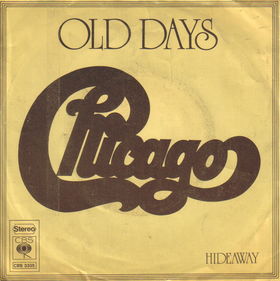
"Old Days" is a song written by James Pankow for the group Chicago and recorded for their album Chicago VIII (1975). It was the second single released from that album with lead vocals by Peter Cetera.

"Baby, What a Big Surprise" is a ballad written by Chicago's then bassist/singer Peter Cetera, which appeared on their album Chicago XI (1977), with Cetera singing lead vocals. The first single released from the album reached number 4 on the US Billboard Hot 100 chart.
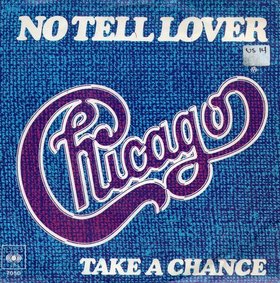
"No Tell Lover" is a song written by Lee Loughnane, Danny Seraphine, and Peter Cetera for the group Chicago and recorded for their album Hot Streets (1978), with Cetera and Donnie Dacus singing lead vocals. The second single released from that album, it reached No. 14 on the U.S. Billboard Hot 100 chart and No. 5 on the adult contemporary chart.
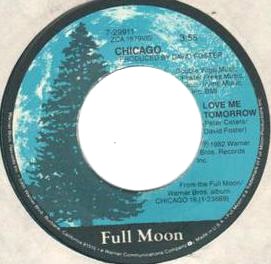
"Love Me Tomorrow" is a song written by Peter Cetera and David Foster for the group Chicago and recorded for their album Chicago 16 (1982), with Cetera singing lead vocals. The second single released from the album, it reached No. 22 on the U.S. Billboard Hot 100 chart and No. 8 on the adult contemporary chart. Songwriter Cetera, a member of the American Society of Composers, Authors and Publishers (ASCAP), won an ASCAP Pop Music Award for the song in the category, Most Performed Songs.
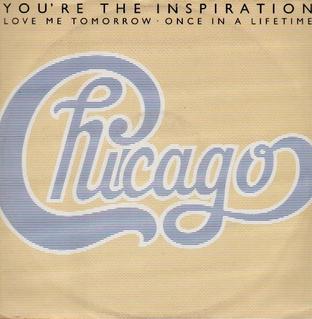
"You're the Inspiration" is a song written by Peter Cetera and David Foster for the group Chicago and recorded for their fourteenth studio album Chicago 17 (1984), with Cetera singing lead vocals. The third single released from that album, it reached No. 3 on the US Billboard Hot 100 chart in January 1985 and also climbed to the top position on the Adult Contemporary chart at the same time. The song won honors for Foster and Cetera from the American Society of Composers, Authors and Publishers (ASCAP), in 1986 in the most-performed songs category.

"Only Yesterday" is a song recorded by the Carpenters. Released on March 14, 1975, the song was composed by Richard Carpenter and John Bettis. "Only Yesterday" peaked at number four on the Billboard Hot 100 and number one on the Adult Contemporary (AC) charts, The Carpenters' eleventh number one on that chart.

"Who Loves You" is the title song of a 1975 album by The Four Seasons. It was composed by Bob Gaudio and Judy Parker and produced by Gaudio. It reached number 3 on the Billboard Hot 100 in November 1975.
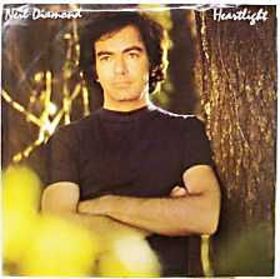
"Heartlight" is a song written by Neil Diamond, Carole Bayer Sager and her then-husband, Burt Bacharach, and recorded by Diamond in 1982. It is the first track on Diamond's 1982 album, also titled Heartlight, and reached number five on the Billboard Hot 100, becoming his thirteenth top 10 hit on the chart. It also spent four weeks atop the adult contemporary chart in late 1982, and was the last of his eight #1s on that chart. Reportedly, it was inspired by the 1982 film E.T. the Extra-Terrestrial, and Diamond allegedly settled with MCA/Universal for $25,000, due to its supposedly drawing on the material of the film.
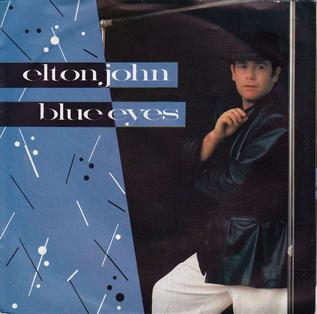
"Blue Eyes" is a song performed by English musician Elton John with music and lyrics written by John and Gary Osborne. It was released in 1982, as the UK lead single from John's 16th studio album, Jump Up! (1982). It was released as the album's second single in the US. It hit No. 8 in the UK; in the US, it spent three weeks at No. 10 on the Cash Box chart, went to No. 12 on the Billboard Hot 100, and spent two weeks at No. 1 on the Billboard AC chart. John performed this song often in his concerts until 2012.

"I Believe You" is a love ballad composed by Don and Dick Addrisi which was a 1977 single for Dorothy Moore; taken from her self-titled Dorothy Moore album. "I Believe You" reached #5 R&B and crossed over to the US Pop Top 30 at number 27. The track also reached number 20 in the UK.

"Place in This World" is a song by American musician Michael W. Smith, released in 1991 as the second single from his 1990 album Go West Young Man. The song became his biggest success in mainstream music when it hit No. 6 on the Billboard Hot 100. It lasted 21 weeks on the overall chart. The song is played in B major, mod. to C at 72 beats per minute.

"Real Love" is a hit song by The Doobie Brothers, the first of three singles from their 1980 LP, One Step Closer.
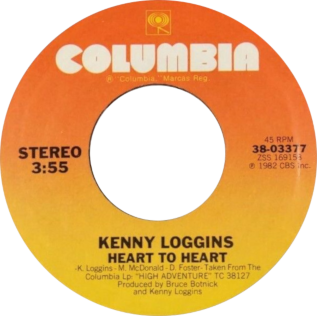
"Heart to Heart" is a song by American musician Kenny Loggins, co-written with Michael McDonald, and composer David Foster. It was released in 1982 as the second of three singles from his 1982 album High Adventure. It reached number 15 on the Billboard Hot 100 and spent five weeks in that position, from late January through late February. It spent a total of 13 weeks in the Top 40, and 17 weeks on the Hot 100. It also reached number 15 on the U.S. Cash Box Top 100.

"Save It for a Rainy Day" is a song by American singer/songwriter Stephen Bishop. The song was the first of two hit singles from his debut album, Careless. It features a guitar solo by Eric Clapton and Chaka Khan on backing vocals toward the close of the song.
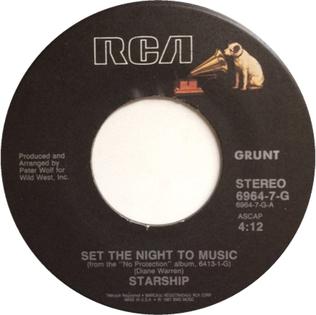
"Set the Night to Music" is a song written by Diane Warren and recorded by Starship for their LP, No Protection (1987). It became a major hit for Roberta Flack in 1991. Starship's original version became a Top 10 hit on the U.S. Billboard Adult Contemporary chart, reaching number nine in the spring of 1988, and also charted minorly in Canada. The song appeared at the end credits of the 1988 fantasy-comedy film Vice Versa starring Judge Reinhold and Fred Savage.

"Take Me Back to Chicago", originally released on the Chicago XI album, was a 1978 chart hit in the U.S. and Canada for the band Chicago. The song features Chaka Khan on backing vocals.



















